The Ausbund: Amish Church Songbook
An ancient Anabaptist hymnal
The Ausbund is a very important book for the Amish. This hymnal contains centuries-old songs originating with Anabaptist captives held at the Oberhaus castle prison in Passau, located in present-day southeastern Germany.
 Amishman Benuel Blank wrote The Amazing Story of the Ausbund about this remarkable songbook. About the Ausbund Blank writes:
Amishman Benuel Blank wrote The Amazing Story of the Ausbund about this remarkable songbook. About the Ausbund Blank writes:
The Ausbund hymnbook, used by the early Anabaptist Swiss Brethren, is the oldest songbook in the world still in continuous use.
First printed in the year 1564, the Ausbund is used regularly in the Amish churches of today.
It has become an Anabaptist classic, and well over a hundred thousand have been printed here in America. It has gone through at least 60 known printings.
About ten thousand Ausbunds are printed every year, most of them going into use in the plain churches. In an Amish church district, except for the church benches, there is very little property owned jointly by all the church members, except the hymnbooks. Some small districts may own less than 30 books, while the larger ones may own over a hundred (Amazing Story of the Ausbund p. 1).
The songs of the Ausbund are an important reminder of the suffering and faith of Anabaptist ancestors, an example for Amish and other Anabaptist peoples who use the book today. Blank notes that the Ausbund is “not to be considered a holy book like the Bible”, but one which has nonetheless had an immense influence on Amish and other Anabaptists (p. 3).
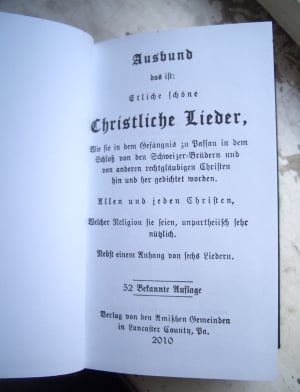
The Ausbund in Amish church
When you enter Amish church service, Ausbunds are already set out on the benches for congregants. Amish church begins with singing lasting from 25-30 minutes or longer (as in more conservative churches or during the period of pre-baptismal instruction when ministers will spend time with baptismal candidates at the beginning of church services). After church is over they are collected and travel to the next home via the Amish church wagon, which also carries church benches.
Ausbunds do not contain musical notes, and tunes are learned and passed down from one generation to the next. A song leader sings the opening notes of each line, after which the rest of the congregation joins in. Hymns are very slow with drawn-out notes.
As Blank explains, “the many generations of people singing from it over these hundreds of years have learned the tunes by ear. The tunes that are used have no answering chorus. It is “music for the soul, rather than music for the ear,” as our slow tunes have sometimes been described” (p. 50).
Creating the Ausbund
The early Anabaptists would have appreciated such music for the soul, as they were widely persecuted for their beliefs, a maltreatment which often included imprisonment, torture and execution. The core songs of the Ausbund were formulated by 53 Anabaptist prisoners held in the dungeon at the castle at Passau over the years 1535-1540. The hymns they created and sung were adapted from a number of sources, including the Lord’s Prayer, Old Testament Psalms, and the Sermon on the Mount, using already-existing tunes (pp. 31-32).
The Ausbund has been added to and expanded over the years, and consists of three distinct parts (p. 62). As one might expect, tunes have become altered over the course of passing them down over many years and among many different groups:
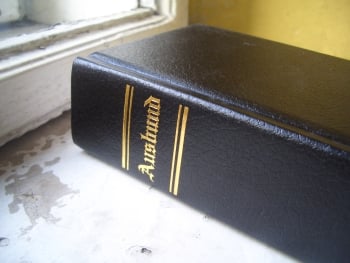 The slow tunes of the Ausbund songs have most certainly been changed somewhat over the 450 years since the Passau prisoners sang them to the poems they composed. They do vary from one plain church group to another, and as different plain-people settlements become established, it can be expected that the song tunes will soon begin to develop slight variations. Throughout the course of many generations, the tunes have slowly evolved into an almost infinite number of slight changes (p. 50).
The slow tunes of the Ausbund songs have most certainly been changed somewhat over the 450 years since the Passau prisoners sang them to the poems they composed. They do vary from one plain church group to another, and as different plain-people settlements become established, it can be expected that the song tunes will soon begin to develop slight variations. Throughout the course of many generations, the tunes have slowly evolved into an almost infinite number of slight changes (p. 50).
Das Loblied
The best known hymn is Das Loblied, or “Hymn of Praise”. The Loblied is the second song sung in all Amish church services. It is hymn # 131 in the Ausbund. Here is an English translation (source):
1. O Lord Father, we bless thy name,
Thy love and thy goodness praise;
That thou, O Lord, so graciously
Have been to us always.
Thou hast brought us together, O Lord,
To be admonished through thy word.
Bestow on us thy grace.
2. O may thy servant be endowed
With wisdom from on high,
To preach thy word with truth and power,
Thy name to glorify.
Which needful is to they own praise,
Give hunger for thy word always,
This should be our desire.
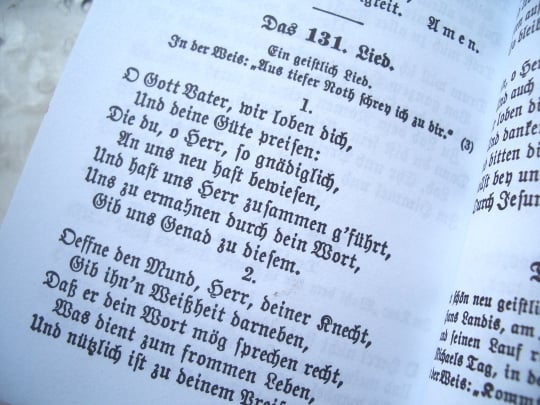
3. Put wisdom in our hearts while here
On earth thy will be known,
They word through grace to understand
What thou would have us to do.
To live in righteousness, O Lord,
Submissive to thy word,
That all our vows prove true.
4. Thine only be the glory, O Lord,
Likeness all might and power.
That we praise thee in our assembly
And feel grateful every hour.
With all our hearts we pray,
Wilt thou be with us every day
Through Christ our Lord. Amen.
Amish churches can differ in many ways, but the Loblied‘s position as the second song sung in every church service is one unifying aspect which stretches over all of North America’s 1,900+ Amish congregations. Writing of the Lancaster County Amish, Donald Kraybill notes that “on a given Sunday morning, all the congregations holding services across the settlement are singing the same song at roughly the same time, an experience one member described as giving a beautiful feeling of unity among the churches” (The Riddle of Amish Culture p. 123).
A heritage of song
If you’d like to learn more about this important songbook, The Amazing Story of the Ausbund is a good place to start. Benuel Blank writes in the concluding pages of his book:
Let us thank God for our heritage of song. Today’s descendants in faith of the Anabaptists of the 1500s are singing songs in settings unbelievably different from the dire surroundings in which many of the songs were composed.
Even though their singing voices were often stifled by martyrs’ deaths, congregational singing has always been a traditional part of Anabaptist worship. Although there have been some denominations of the Christian church who objected to hymnbooks and prayer books on the grounds that all singing and praying should always come from the heart and not from a book, the Anabaptists became a people of song.
The conservative part of Anabaptism still believes in worshiping God in simplicity, with human voices blending together in sounds of praise, rather than listening to a well-trained choir or to the organ music in a large and costly church cathedral; quite a contrast for worshiping the Savior of the world born in a lowly manger. Their sanctuaries of worship are their homes, barns, sheds and shops (p. 119).
Other songbooks
This isn’t the only hymnal that Amish use. In some groups church singing is done from similar though different texts. For example, below you’ll see a version of a songbook used by Amish at Arthur, Illinois. This photo was sent in by a non-Amish reader; it contains the English translation beneath the German text.
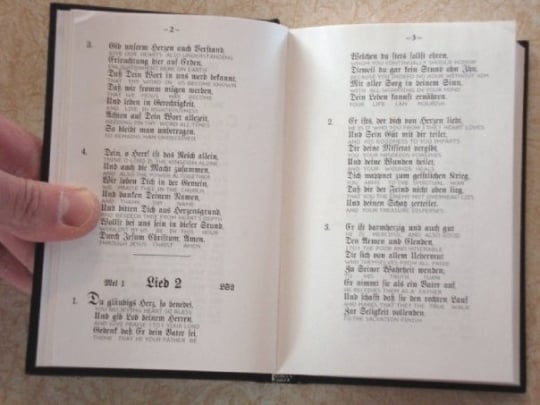
This book has been described as “a collection of some of the Ausbund hymns along with hymns that adapt more easily to some of the more modern hymn tunes such as ‘What a Friend We Have In Jesus.'” Amish also sing English-language songs on different occasions, for example at youth and family singings.






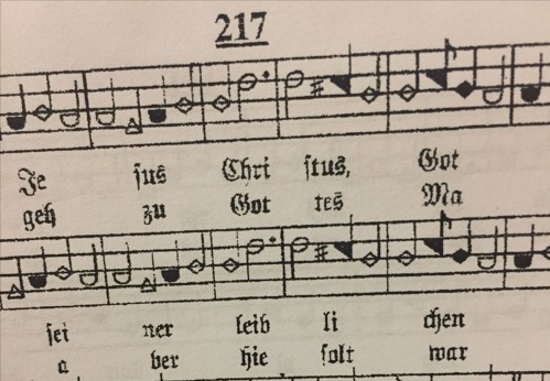
Thanks for sharing about The Ausbund, Erik. I enjoyed reading
the quotes from Benuel Blank’s book and would like to read it.
I found it interesting that Amish men have singing practices where
I think they practice singing hymns from The Ausbund so they can
lead them in Sunday worship. Sometimes when I stop by some good
Amish friend’s home on a weekday evening the father of the family
who I want to visit with is gone to singing practice, joining
other men at a neighbor’s house. I also read of this from time to
time in scribe’s letters in The Budget. Recently I read in a
scribe’s letter in The Budget that he had gone to singing practice
the week before. He also said something like “I’m one of the older
men in my district and we’ve had to learn the tunes just by singing
them. The younger men now have the advantage of being able to
buy songbooks with some of the music written down.” It seems like
recently I saw a songbook with the musical notes of some of the songs from The Ausbund written down. I think the book might have
been in the Pathways bookstore near Lagrange.
Amish singing practice
Al I used to run into singing practice while selling books; it was typically on weekday evenings. I would always come back later. That was actually the first time I heard Amish church singing, as I hadn’t yet been to a service at the time.
Erik have you ever attended a Amish church service yet?
Good morning Erik and an interesting post for this Monday, i was wondering if you have ever been fortunate enough to have attended a Amish church service, and if you have what was it like. Do they (Amish) have a special meal after, and i have heard myself that they may play say “baseball” or enjoy the day after the service. Thanks Erik. Richard
Amish church experience
Hi Richard, thanks for asking, I’ve probably been to about 10 Amish services, mostly regular church services as well as funeral and some Sunday School (in New Order churches). I enjoy going to church even though I understand little except in the few cases where the preacher will try to use some English for my benefit (it’s very nice but a slightly strange feeling). I try to sing along with the Ausbund even though I don’t know the tunes or German for that matter. In my experience people are always welcoming and it is a good experience. They often fill me in on what the sermon was about afterwards. You can also pick up some Biblical names during the sermon and have a sense of what is being discussed.
On a “human note” service is long and you can actually get drowsy, since besides the singing at beginning and end there isn’t a lot of interaction in terms of responses from the congregation.
Here are a couple of posts I wrote on the topic:
https://amishamerica.com/what-is-amish-church-like/
https://amishamerica.com/falling-asleep-in-church/
Vielen Dank!
Thank you for posting such an interesting discussion. The sound of Das Loblied really hits deep for me–don’t understand why, but even reading the German language, imagining the history of these prayers written in prison really touch me deeply. The only time I heard such singing was when I was on a bicycle ride through the Pennsylvania countryside on a Sunday morning. . . peddled past a barn with this incredible singing that reached the road. . .
I actually own a copy of the Ausbund, I bought it while researching the Anabaptist movements for my Masters degree thesis.
I would LOVE to get my hands on a copy of The Ausbund! I have a collection of hymnals–the oldest one is from 1928–and it would be a fabulous addition to my collection.
Thanks Erik for sharing!
purchasing ausbund
you can purchase an Ausbund from Rabers Bookstore 2467 CR 600, Baltic, Ohio 43804. You can write and request one and pay upon receiving it. It will cost app. 7.50 plus shipping. This Bookstore was started by my great grandfather and is currently in its third generation, which is my parents. They have 50% German books, a lot that they get reprinted as needed.
Good to know…thank you!
Ausbund
Hello.
I would like to order an Ausbund hymnbook(original in old german language) song book reprint.
I can not buy it in Germany.
I do not know how to order and pay.
I’ve a adress but I can’t contact the store
Raber’s Bookstore
2467 County Road 600
Baltic, OH 43804
I live in Germany
Excuse my bad English
Ausbund Bücher
Lieber Ralph,
herzliche Grüße aus Lübeck an der Ostsee.
Du kannst bei der Mennonitischen Forschungsstelle
auf dem Weiherhof einen Ausbund erwerben.
Ich selbst habe eine Sammlung mit Gesangbüchern,
besonders auch Amischen. Vielleicht kannst Du mich
per Google in Lübeck finden. michael.lohrer
dann nach dem @ vg-sh.de
Vielleicht können wir uns da mal austauschen.
Michael
Ausbund
Hallo Michael
danke für deine Antwort. Ich war bei der Mennonitischen Forschungsstelle auf der Webside. Leider hab ich den Ausbund nicht in der verfügbaren Bücherliste gefunden.Ich suche einen schönen Nachdruck in alter Frakturschrift ,schwarzem Einband….usw du weißt was ich meine.Keine Tachenbuch Ausgabe…
Liebe grüße
Lieber Ralph,
die schwarze Ausgabe des Ausbund erscheint seit Jahren im selben Druckbild. Diese kann man über die Forschungsstelle beziehen. Außerdem gibt es eine zweisprachige Ausgabe bei Carlisle Printing, die habe ich auch von dort. Mein ältestes Originalexemplar stammt aus der Schweiz 1809 mit Schließen. und dann gibt es auch Reprints der ganz alten Ausgaben. Ich kann Dir mal eine Lise schicken, wenn Du mich anmailst.
Herzliche Grüße
Michael
Ausbund
Hallo Michael
heute ist mein Ausbund vom Mennoitischen Geschichtsverein angekommen. Danke noch einmal für den Tip
Liebe Grüße Ralph
1871 German song book
I have 2 books both from the 1800’s and in German one a Bible and the other a song book I will be placing them in an auction soon if you are interested email me at arose1190@yahoo.com
Ausbund
You can read Das Ausbund on the these links via a PDF file online:
http://babel.hathitrust.org/cgi/pt?id=hvd.32044077968501;skin=mobile#page/776/mode/2up
Or
https://openlibrary.org/works/OL13180150W/Ausbund
Mach’s gut!
Comment on The Ausbund
Thank you for posting this, Erik, I don’t have any knowledge about Amish worship services. I join Richard, above, in wondering if you have attended any Amish services and what your impression was.
Thanks Kim, I just jotted a few impressions in the response to Richard above. I have been to church in Ohio and Pennsylvania, in Old Order and New Order churches. I have never been to a Swartzentruber service, which is typically longer than mainstream Old Order services.
More info on the 'Loblied'
When it is time to sing a song, a couple of the older men announce the song to sing by its page number in the Ausbund and who is to lead the song. So, the Loblied is annouced as 770, instead of ‘Loblied’ or 131.
The Loblied is sung at all church services and weddings, but never at funerals. Don’t know why.
You can hear verse one of the ‘Loblied’ here: http://www.youtube.com/watch?v=8t1wrB9A7hQ Sorry about the video not being appropriate. On the right side of that web page, you find a link to a video by joeyoder1 with the other 3 verses of the ‘Loblied’. That 2nd video is from a Sunday evening youth sing, and is traditionally the 2nd song sung there too. It is much faster than the verse 1 from the church service. The audio from verse 1 comes from a CD of Amish singing at a church service. I do not know if that CD is still available, nor where you would purchase it today, it was originally to be found at the Mennohof in Shipshewana, Ind. Saloma has 2 more of the tracks from that CD on her blog. I sometimes play these recordings and sing along for nostalgia’s sake.
Erik gives you the English, here is the German to the first verse of the Loblied
O Gott Vater, wir loben Dich,
Und Deine Guete preisen,
Das Du Dich, o Herr, gnaediglich,
An uns neu hast beweisen,
Und hast uns, Herr, zusammen g’fuehrt,
Uns zu ermahnen durch Dein Wort,
Gieb uns Genad zu diesem.
When the Amish sing a song, the leader sings the first syllable of the line, the rest join in on the second syllable. The last syllable of a line is much shorter than the rest.
There was a Ausbund to be found in each home in our community, so it is not a ‘church only’ book.
Thanks for adding this Lance. I did see that Loblied on Youtube. A syllable can have surprisingly many notes, can’t it. That was one of the first things that struck me when I first heard Amish church singing.
Thanks for posting the youtube link to the song. And thanks for the warning about the video not being appropriate (shows Amish people out in public who were obviously filmed without permission). I listened to the song without watching the video and it was quite a fascinating sound. There’s no way to imagine how it would sound without actually hearing it.
The German is:
O Gott Vater, wir loben Dich,
und Deine Güte preisen:
die du, o Herr, gnädiglich,
an uns neu hast bewiesen,
und hast uns Herr zusammen g′führt,
uns zu ermahnen durch dein Wort,
gib uns Genad zu diesem.
Hearing Loblied
It looks like a thick volume! I like the selection you chose to share.
I wonder if there is a file online of a group of singers singing “Loblied”?
While browsing through the books in an Amish bookstore in Dover, DE, I picked up a book called “The Amazing Story of the Ausbund: the oldest hymnal in the world known to still be in continuous use” by Benuel Blank. Now they had the actual Ausbund there as well, but it was in german (which I cant read). This book however was in english. Knowing how important the hymnal was to the Amish, I figured this would be a good way to learn about it a little more. So I picked it up. When I went to check out, the store owner, who was Amish, said with surprise “YOU know about the Ausbund?!? I smiled as I told her I only knew a little.
I’ve enjoyed Blank’s book Kevin. He has a nice writing style which fits more casual historical reading. It is addressed at some points to an Amish audience but accessible for us non-Amish as well.
Can you share which bookstore in Dover? Was this one of the dry goods shops with books? I can’t remember if I was in a mainly-books place in that community.
Sure I can! The store was Shady Lane Selections in Dover. We actually stopped there because it was listed as a quilt store, and my wife loves to quilt. But I was pleasantly surprised to find a very nice book selection, as well as other dry goods. The owners were very nice, and we enjoyed our visit with them.
Great, thanks Kevin. Yes I’ve been there, nice shop.
And I totally agree with Eric that Blank’s book is a good place to try to understand it more!
Question?
Im so fascinated with The Ausbund…Does anyone know the best place to purchase one that the Amish would have in their churches? Thanks so much =)
Perhaps a good online store if there arent any in Texas cause I dont see myself making it to Dover, DE. Maybe I can order it from this store in DE? Thanks again
Ausbund from Amish book store
Misty in Amish stores they’re usually in the $7-8 range. You should be able to get one by mail from Raber’s bookstore in Ohio among others. Here is some info on Raber’s bookstore and the address for ordering:
https://amishamerica.com/amish-bookstore/
Raber’s Bookstore
2467 County Road 600
Baltic, OH 43804
The 2011 price was $7.50; US mailing rates for 0-19.99 as of 2011 was $3. If someone from Raber’s reads this they can confirm prices for 2012, but I can’t imagine it would be that much different.
in 2003 there was a german songbook (Unparteiifche Leidersummlung)which means Impartial song collection, printed that has the English words underneath each line. It makes it very nice to see what each line means.They printed it to help those who want to read and understand german, and also visitors and members who dont understand all of it.The first song in it is the LobLeid.A very interesting book.
And there are some ausbund on ebay for $35.00-40.00 each! please dont pay that much for them.LOL
Naomi,
My husband and I saw the book you mentioned when we were in Holmes County, OH, last week. Do you (or anyone else on here) know what is meant by the “Impartial” song collection?
Comment on The Ausbund
There are some other interesting sources to read on Amish and Pennsylvania plain musical traditions, most are from the mid-20th century. I’d recommend the chapter in Pennsylvania Songs and Legends (1949) on “Amish Hymns as Folk Music” by J. William Frey, the book was edited by George Korson and published by University of Penna. Press. Frey includes musical examples, texts in modern type, and commentary.
Also Don Yoder’s Pennsylvania Spirituals recounts folk religious singing among varying sects of Pennsylvania German and Plain, my copy is not within reach at the moment, it was published in the 1961.
Also a PhD dissertation on Singing Schools in Pennsylvania which (please forgive me) I’m working from memory, by Richard Rosewall or Rosewell (I believe) recounts singing among the same PA groups of German and Plain groups as Yoder’s work. I couldn’t find my copy (it’s packed away most likely), and couldn’t find a quick online reference to double check.
In the past 1800-1910, many Plain members enjoyed singing as a recreation, not just as rehearsal for worship, including seperate and mixed sex gatherings for singing in homes and schools – has this tradition disappeared from Amish life?
I recently acquired a copy of the Gesangbuch (2007) which does include tunes, is it used in worship?
Thanks, I just found your site this evening, and have found it most informative and interesting.
Amish recreational singing
Eric, I’m glad you found the site and took the time to share these resources.
Overall there is an appreciation for singing in what we might call recreational settings. Women sing frequently while working, singing is a big part of youth gatherings, men gather on weekdays to practice church songs, children sing in schools regularly and for visitors, and may whip off a song at home for guests as well.
The Ausbund is the primary book used by (nearly all) Amish in worship settings…it’s possible the song book you have may be used outside of church however as Amish do also sing from hymn books w/tunes.
You might find this piece on singing and Amish children interesting: http://socrates.berkeley.edu/~caforum/volume2/vol2_article2.html
Erik,
Thank you very much for the link. It mentions some of the things that are in the old Frey article, which I re-read last night, having not looked at in probably 12 or 15 years. He mentions that the Amish in the 1920’s-40’s were holding Sunday evening singings for Young people (a courtship rital mentioned in 19th century accounts of life), and used some of the same resource material as the Berkeley article you listed.
According to Frey, the music for the Sunday morning worship, and the men’s leadership singing weeknight rehearsals are the “slow tunes” from the Ausbund, and the other book I have the Gesangbuch, and the other book another poster Lance I believe listed the same practice, the other tunes are “fast tunes”, and are often borrowed from outside the Amish tradition, even many of the tunes in the Ausbund according to George Pullen Jackson that are not taken from European liturgical chant of the late middle ages are borrowed from other folk songs, Lutheran and Dutch hymns of the 1500’s, and sometimes later into the 1600’s.
I did see this CD with samples that you can listen to of various styles of Amish music making, it also includes the chanting style of speaking for preaching and prayers: http://www.mennolink.org/cgi-bin/search.cgi?bk.amv.01.txt&track=17
Some additional sources of information:
Jackson, George Pullen. 1945. The American Amish Medieval Folk Tunes Today. Southern Folklore Quarterly 10:151-7.
Yoder, Joseph W. 1942. Amische Lieder. Huntingdon, Pennsylvania: Yoder Publishing.
Joseph Yoder was Amish and his collection of tunes was an attempt to preserve the tunes of the Ausbund so that they would not be lost and is one of the most important volumes on Amish music published.
There was also some very good discussions on the FASOLA shape note discussion board several years back, I will try to find any relevant and useful items to share.
Also the library of Congress has a collection of Amish recordings from the 1930’s and 40’s, it would be interesting to compare them to Amish singing from today to see the small changes if any that may have taken place in 60+ years of oral and written tradition. If I can find links I will post them here as well for others to enjoy.
Finally, it should be noted that many low church Protestant and Anabaptist churches would have sounded much like this until the period between 1720-1820 when over the course of a century many of their musical traditions changed.
My mistake, Yoder was Mennonite. Here is a nice short biography of him:
http://pabook.libraries.psu.edu/palitmap/bios/Yoder__Joseph.html
I just ran across this post while looking up some information on the Ausbund. My husband and I had the privilege last Sunday of being in our second Amish church service in Lancaster County. We just came back from vacation there and in Holmes County and stayed with an Amish family in each location. The lady we went to church with in PA noticed that I knew which song would be the second of the service. That was because the family we visited with in OH had told us about song 131 being used in pretty much all Amish churches.
A couple of interesting things: Many of the Amish women asked me during the meal following church if my husband and I knew German. They noticed that my husband was singing along during the service, but didn’t know that he was just sounding out the words — which was easier to do because of the very slow pace of the singing.
The Amish folks we visited with gave us a reason for the slow pace of the singing. They said that in centuries past most of the songs were written by Anabaptists who were in prison for their beliefs. Their persecutors further ridiculed them by dancing to the songs the prisoners sang. So they began to sing the songs too slowly to be danced to. The practice of singing the songs that way has carried over to today’s worship services. But they said the songs would be sung much faster in some instances, like youth singings.
Mark and the Lob Lied
I read this post to my son, Mark, who joined the Amish. He mentioned that on Sunday, September 30, 2012 which was his church district’s fall communion Sunday he was asked to start the Lob Lied. But, Mark said there was a mix-up. After he was asked the man who is in charge of the hymns found out there was a young man visiting the church who was from the West District. He wasn’t going to be in his home district the next Sunday when they were to have communion because he was going to be away to his girlfriend’s community helping to get ready for his wedding that next week. So he still wanted to have communion so he came to Mark’s district. Anyway, they asked this visitor to start the Lob Lied so as far as Mark knew, he was off the hook. Anyway, the time came for the Lob Lied to be sung and there was nothing. Just silence. Then, Mark said he was startled to get a poke in the back and the man behind him whispered for him to start the Lob Lied. Mark said he figured they’d decided for him to do the first two verses and the visitor to do the last two verses which I guess sometimes happens. Well, Mark said he started the first two verses and then stopped. Nothing, again. He looked over at the young visitor and he shook his head so Mark quickly started the third verse and went on to finish the fourth verse. After service Mark asked what had happened. Turns out the visiting youth had a sore throat and couldn’t sing but nobody got back to Mark to let him know he was “on” for the Lob Lied.
Lob Lied
Robert Bender sings 2 lines of the lob lied in this video I did starting at minute 22:00. He sings on the cd “In Dutch” by John Schmid.
other songbooks
Do the Amish use any other songbooks besides the Ausbund? If so do they ever use one with the title Gesangbuch?
Looking for hymn
Looking for a hymn fromthe Ausbund with some of the lyrics being
“Ah, good night to those I love so; Good night to my heart’s desire, Good night to those hearts full of woe; Out of love they weep distressed. Tho’ I from you pass away; In the grave you lay my clay; I will rise again securely, Greet you in eternity.”
Gute Nacht, ihr meine Lieben
Phyllis,
There is a German song similar to what you ask, but it was probably written later than the Ausbund songs. In the Liedersammlung or Gingerich songbook, in the category of Death and Burial songs, is the song “Gute nacht, ihr meine Lieben” with 11 verses. Sometimes it is read at the graveside committal service. Here is the first verse:
Gute Nacht, ihr meine Lieben;
Gute Nacht, ihr Herzensfreund;
Gute Nacht, die sich betrüben,
Und aus Lieb für mich jetzt weint;
Scheid ich gleichwohl von euch ab,
Und ihr legt mein’n Leib in’s Grab,
Wird er wieder auferstehen,
Und ich werd euch ewig sehen.
The first four lines are inscribed on an 1855 Schumacher tombstone in Lancaster County, PA:
http://www.ristenbatt.com/genealogy/shumkrcm.htm
The Ausbund and Liedersammlung German songbooks are mentioned in the book Plain Diversity:
http://books.google.com/books?id=rAcj10mFGeMC&pg=PA157&lpg=PA157&dq=guengerich+songbook&source=bl&ots=w07d4fcLYC&sig=ku7jXYlzhi-kH6Mj4IJo-ilkIBA&hl=en&sa=X&ei=dPnmUsXUNqrFsATG54GQBw&ved=0CEkQ6AEwBg#v=onepage&q=guengerich%20songbook&f=false
Wouldn’t you know it!
http://www.hymnary.org/text/gute_nacht_ihr_meine_lieben
lists Jacob Danner as the author of the German song “Gute Nacht, ihr meine Lieben.” The song appeared in hymnals from 1792 to 1927. The website has photos or page scans from 12 books showing the words or parts of the song. And it lists the names of 26 songbooks containing the song.
By the way, they also have a page about “O Gott, Vater, wir loben dich” at:
http://www.hymnary.org/text/o_gott_vater_wir_loben_dich
The Lob Lied has been translated into English as “Our Father, God, thy name we praise”
http://www.hymnary.org/text/our_father_god_thy_name_we_praise
and as “O God and Father, thee we bless”
http://www.hymnary.org/text/o_god_and_father_thee_we_bless
Gingrich book
This is not in the Ausbund.its called theKleinie Buch or the Gingrich book it’s only used at the graveyard after a funeral.Josef von Klarrformer older order Ashland Ohio.314-6655053.
Ausbund
I was talking to my son, Mark, about the Ausbund and the hymnals that they use. Mark said that his community uses “The Unpartische Gesangbuch”. I don’t know if I spelled that right or not. He said that it is a collection of hymns from the Ausbund. However, it also has some hymns, in German, whose meter makes them easier to sing “fast way” for Sunday School and the Sunday evening hymn sings. That hymnal was developed, in part, in the Belle Center Amish Church. You can buy the Ausbund and the Unpartische Gesangbuch from the Pathway Bookstore.
I read the “Gute Nacht” hymns to Mark. Well, not the whole thing. Just a couple of lines. He said that is the hymn that is sung at the graveyard at the burial service. After the casket is lowered into the grave and the family and loved ones are shoveling the dirt in the grave, a minister will read one verse of this hymn and then about ten or so of the men of the church will sing this hymn “slow way.” The minister then goes on and reads another verse followed by the men singing the verse. This goes on for about five or six verses.
There was some interesting news about The Ausbund in the March 5 issue of The Budget newspaper, in news sent in by Leroy and Mary Jane Beachy. Leroy Beachy has completed a display collection and cabinet with 24 of the 30 publications of The Ausbund from 1564 to 1935. The display also includes copies of the title pages of all of the editions of The Ausbund, including the 10 European editions. He has moved this display to Behalt, the Mennonite Information Center in Berlin, Ohio, and a public unveiling of the display will be sometime in April, 2014.
The Ausbund & Froschauer Bible reproductions
Al on the Ausbund, a friend just passed on a somewhat related comment that I don’t think he’d mind me sharing:
There is an Amishman in Allen County, IN who is making reproductions of the first printing of the Ausbund and the first printing of the Froschauer Bible. The Menonite History Library at Goshen College had a copy of each. The Ausbund has a date of 2013 and the printers signature with a date of 2013. They are a wonderfully neat reproduction, hand tooled leather, hand made brass claps, pages that appear to be printed on a press and a very convincing patina. The Ausbund sells for around $200, the Bible sells for close to a thousand.
I had the pleasure of visiting The Mennonite Heritage Center this past June, and the display of the different editions of the Ausbund is absolutely beautiful. The display goes into some detail about its history as well. My husband and I have studied music professionally – my husband’s focus is on music for worship, as he is a church musician – and this was the first time I have been exposed to the history surrounding the Ausbund, despite being very familiar (or so I thought) with church history and the evolution of its music. My experience at the Heritage Center was truly inspiring, and I walked away understanding a little more about what it means to be a Christian. Thank you all for sharing information about the books and links. I will enjoy the study!
im leben muss man sich entscheiden
wenn ich schon auf deutsche tugenden stehe, dann lebe ich sie.
nicht alles ist richtig überetzt und genau da schleichen sich die fehler ein.
gib uns Genad zu diesem.
richtig!!!
gib uns Gnade zu diesem.
Genad gibt es nicht, das hat auch nichts mit Genitiv zu tun 😀
anstatt Gnade könne man auch sagen “Herr Erbarme Dich unser”
das wäre aber wahrscheinlich zu Katohlisch als Protestant 😀
Good to see ein.Rictig Deutcher
I converted to the old order many yrs ago and knew Bucher Benje quite well. JOSEF VON Klarr.
Loblied
Some Pennsylvania people sing the last half of the last verse of the Loblied at:
Hymn-sing at Stoltzfus Homestead offers insight into Amish culture
http://readingeagle.com/news/article/hymn-sing-at-stoltzfus-homestead-offers-inight-into-amish-culture
Amish Hymn-Sing
https://www.youtube.com/watch?t=253&v=pw3FHH03KRo
Music in Worship, Pennsylvania
Come fellowship in song on Monday, July 20, 2015, at 7 p.m. with members from six different Anabaptist groups: Old Order Amish, Old Order Groffdale Conference Mennonites, Old Order Weaverland Conference Mennonites, Old Order River Brethren, Church of the Brethren, and Lancaster Mennonite Conference. This hymn sing is organized by the Lancaster Mennonite Historical Society in partnership with the Swiss Pioneer Preservation Associates.
In past years, representatives from each group sat around a singer’s table and lead the crowd in singing two songs from the Sunday worship tradition of each group.
Music in Worship will be held at the Martindale Mennonite Fellowship Center, 352 Martindale Road, Ephrata, Pa. This event is free and open to the public.
Find out more:
http://lancasterroots.org/?p=3097
https://www.facebook.com/lmhs.org
http://www.lmhs.org/Home/Events/Lecture_Series/Music_in_Worship (with 5 photos)
Searching for an Amish Hymn
Hello,
I am searching for a specific hymn that is most likely part of the Ausbund. I am the music director at a high school, and our students are putting on the play, “The Amish Project” this year. I am organize music/sound design for the production, and we are searching for information on the hymn that the character Velda sings towards the end of the play. It does not give the title of the hymn, but the words are “O God our Father
O open me
With your love
Teach me to forgive
With your love”
I’m pretty sure that the original version would not be in English. I would love to track down any recordings that are available, or at least find out what the source is.
I would prefer to find out what the original and authentic version of the hymn would be. If anyone knows any information on this hymn please let me know. Thank you!
Dr. Bob
Dear Dr. Bob,
may be a version of the 131. Song of the Ausbund? O Gott, Vater wir loben dich – which is sung in every Amish service.
I’m very interested in Amish hymnals. In my collection I have a copy of “Ausbund” from 1838., a very nice copy. Actually the main Amish Hymnals are translated in the English language.
Some other Hymnals are used in private meetings at home. Only the Beachy Amish use official English Hymnals.
Greetings from Luebeck in North Germany Michael
The Amish Project
Did you ever locate the source of these lyrics in The Amish Project? I am facing the same challenge for a production this fall. Thank you for your help.
German Words and Versions
I’m having a hard time reading the German script in the Ausbund. Could someone write the rest of the verses in German?
Also, I’m noticing there are different versions of Das Lob Lied. For example, in one version, the third line begins with “Dass du Dich” and in another version it says “Die du”. Does anyone know how there came to be different versions?
Thanks,
Jenny
andere Deutsche Gemeinden in America
The Ausbund or Unparteisches book are 2 of 5 german church song books used by congregations from North America.
Check out Hutterites on the web.
Pennsylvania Dutch
Hello,
If you are interested, my book on Pennsylvania Dutch music is available through ebay, amazon, and the publisher. See the link below. The book is part of the Eastman Music History series and discusses the Ausbund some.
https://boydellandbrewer.com/sacred-song-and-the-pennsylvania-dutch-hb.html
If any of you have questions, let me know.
Dan Grimminger
grimminger@aol.com